Nobel Peace Prize winner Oleksandra Matviichuk: Those who committed war crimes should not hide behind Putin
The year 2022 will be remembered not just as the year that Russia started its full-scale war against Ukraine, but also the year that Ukraine received its first Nobel Peace Prize. The Center for Civil Liberties, a human rights organisation that promotes democracy and civil society, was awarded the 2022 Nobel Prize for Peace, one of the most prestigious such prizes in the world. Yet even this unequivocally significant event stirred up lively controversy and debate online.
Many Ukrainians were outraged at the Nobel Committee's decision to award the prize to human rights advocates in Russia, Ukraine and Belarus. Many believed this evoked the old Soviet myth of 'brotherly nations'. Some people even demanded that Ukraine decline the Nobel.
Few people in Ukraine regarded the Nobel Committee's decision as an anti-Putin manoeuvre or a celebration of the resistance against the forces of evil shown by human rights advocates. These are people who have spent years talking about war crimes committed by the Russian army in Chechnya and Ukraine. People who helped to defend those who were arrested during anti-government protests.
People who were often marginalised and whose voices were ignored. That is why Ales Bialiatski, a Belarusian pro-democracy activist, whose country is in effect occupied by Russia, was imprisoned in October 2021. That is also why the Russian human rights organisation Memorial, which has consistently opposed the war in Ukraine for many years, was officially banned in Russia even before the beginning of the full-scale invasion.
"The voices of human rights advocates can finally be heard," says Oleksandra Matviichuk, who heads the Center for Civil Liberties and has been a human rights lawyer for over 20 years. Her organisation helped people who were arrested during the Revolution of Dignity in 2013-14 and the first prisoners of conscience in Russian-occupied Crimea, including Oleh Sentsov and Oleksandr Kolchenko, and reported on the torture of prisoners by Russian soldiers. The Center for Civil Liberties has been documenting war crimes committed by the Russian occupation forces for eight years, all the while searching for legal mechanisms to bring the Russians to justice.
Yet Oleksandra dreams of a time when the Center's work will no longer be necessary in Ukraine. In this interview with Ukrainska Pravda, the Nobel Peace Prize laureate envisions a future tribunal for Russian President Vladimir Putin, reflects on the work of Russian and Belarusian human rights advocates, and reveals what she is planning to do after Ukraine's victory.
- The Nobel Peace Prize has been awarded to Mother Teresa, Nelson Mandela and Henri Dunant. How does it feel to be in their company? - We received the Nobel Peace Prize during a war, which implies a great responsibility.
For many decades, the voices of human rights lawyers and activists from our part of the world have not been heard. Now we have an opportunity to make the voices of Ukrainian human rights advocates heard. - I agree with what you just said about the voices of Ukrainian human rights advocates.
But you shared the Nobel Peace Prize with the Belarusian human rights advocate Ales Bialiatski and Memorial, a Russian organisation. This caused a wave of discussions among Ukrainians; some even called on you to refuse the prize. What do you think the Nobel Committee's decision means?
How can you explain its logic? - The logic behind this decision is that human rights advocates and their work protecting human rights and dignity are crucial to establishing a lasting peace in the region. Because peace is inextricably linked to human rights.
Russia's example shows that a state that systematically violates human rights becomes a threat not only to its own citizens but to the entire region and even the rest of the world. Russia has been persecuting human rights advocates, killing journalists, and dispersing peaceful student protests for decades. At the same time, Russia has waged wars in different countries around the world, using war crimes as a warfare tactic in Chechnya, Georgia, Syria, Mali, Libya and other countries, while established democracies averted their gaze.
They went on shaking hands with Putin, doing business as usual, building Nord Streams. So now we have a full-scale war in the heart of Europe and everyone understands that if we fail to stop Putin in Ukraine, he will go further. This is the outcome of irresponsible policy-making which failed to ground political decisions in human rights values.
- So the world has finally heard not only the voices of human rights advocates from Ukraine, but also those from Russia and Belarus. Did I get that right? - There's one important point.
When journalists abroad ask me about the reaction of Ukrainian society, I always use this point to explain what has caused outrage. Because of course people were outraged at seeing Ukraine, Russia and Belarus together (in that exact order). It is highly reminiscent of the old Soviet myth about 'brotherly nations'.
Everyone knows that this is a lie and there are no brotherly nations. There is a nation that dominates the others, a culture that dominates the others, a language that dominates the others. It is important to explain why the Nobel Peace Prize is not about countries but about people.
If we're going to draw parallels, then let's draw one with the cooperation among dissidents who fought against the Soviet totalitarian apparatus, forging invisible horizontal ties with one another to fight for freedom and human dignity, and demanding freedom for all, not just themselves. This is a story about people.
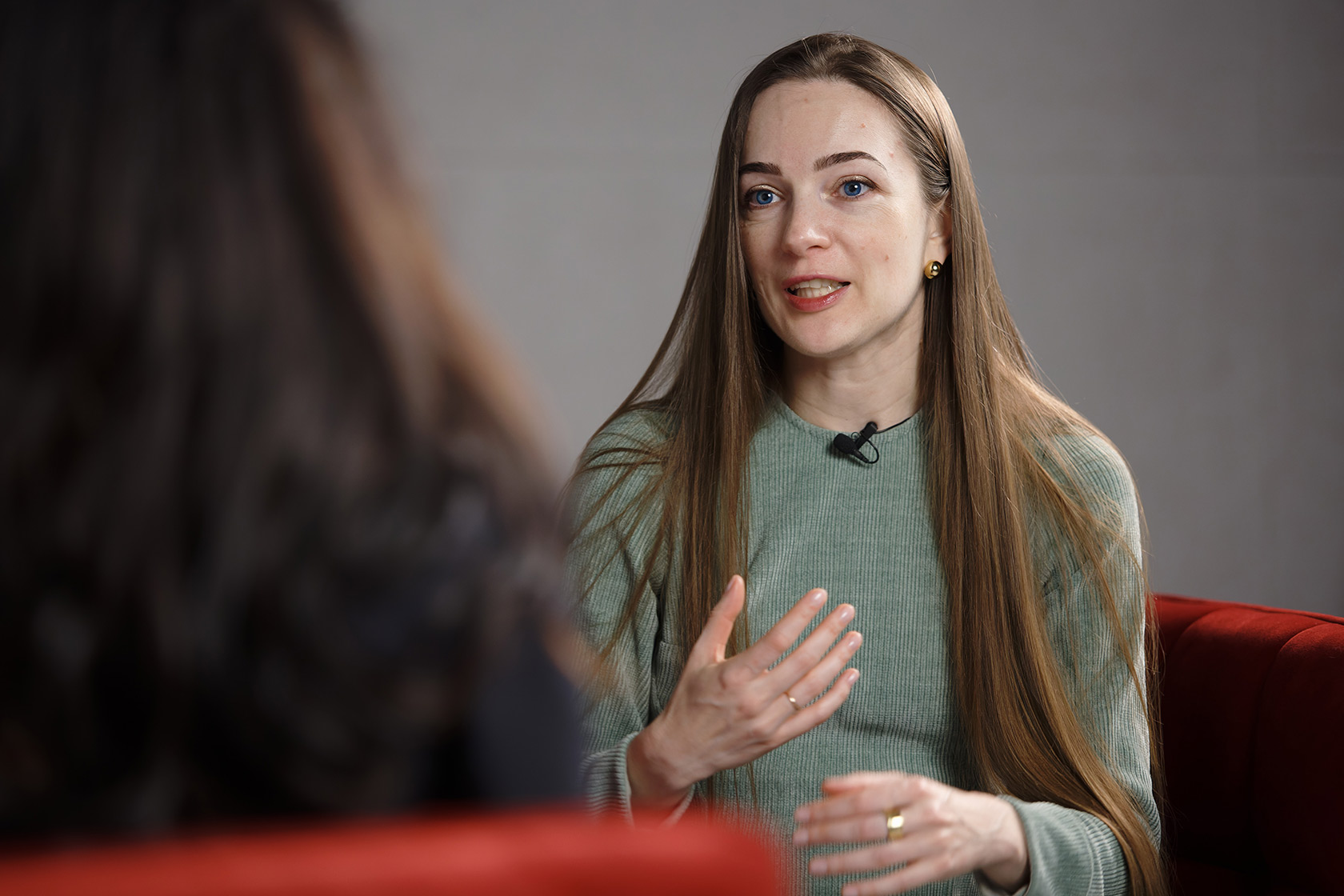 All photos by Dmytro Larin
All photos by Dmytro Larin
- Have you had a chance to work together with Memorial or Belarusian human rights advocates since the full-scale war started? Ales Bialiatski is currently in prison and it's physically impossible to work with him.
- We worked together before the war started. The first time Ales Bialitski was imprisoned on trumped-up charges, I went to Minsk and attended his trial, the one where his disgraceful sentence was pronounced. We've been working with Viasna for years. [The Viasna Human Rights Center is a non-governmental human rights organisation set up by Bialitski in 1996 - ed.]
We understood the problems that authoritarian regimes create; it's a reflection of a broader negative trend in the region. Russia is the trendsetter in our region in this respect. And we have all fought this within the borders of our own countries and, crucially, on an international level, because human rights are universal.
This is also true of Memorial. I can say that I have no ethical qualms. These people have proven their commitment to human rights through their work, not just their words.
But words are important, too. They have always called the war what it is, a war; they have always said that the occupation of Crimea violated international law. For the past eight years they have worked alongside us to aid and defend Ukrainian prisoners of conscience.
We have undertaken joint missions to document [human rights violations]. When this became impossible for us, they gathered information on our behalf: it was less dangerous for them to do so. That's exactly why Memorial has been banned in Russia and Ales Bialitski has been imprisoned.
I'd say that this prize has been awarded to human rights advocates who are fighting together against a shared evil which is attempting to gain a foothold and dominate our part of the world. - I agree with you about this idea of a shared evil. However, the particular circumstances are equally important.
A human rights advocate I know said that this situation still looks odd from the outside. It's the same as if, say, the Nobel Peace Prize in 1942 was shared by members of the Resistance in France and in Germany, as well as human rights advocates or volunteers who were helping people survive in frontline cities and towns. How would you respond to that?
- We can draw various parallels. But the context is quite surreal. Let me reiterate: the Nobel Peace Prize is awarded during a war which started not in February 2022 but in February 2014, a war which is extremely bloody because Russia is deliberately committing war crimes against civilians.
That's how Russia hopes to win this war. Millions of people are suffering because Russia wants to cause pain to break our resistance and occupy our country. So we can draw very different parallels, but their context remains very painful.
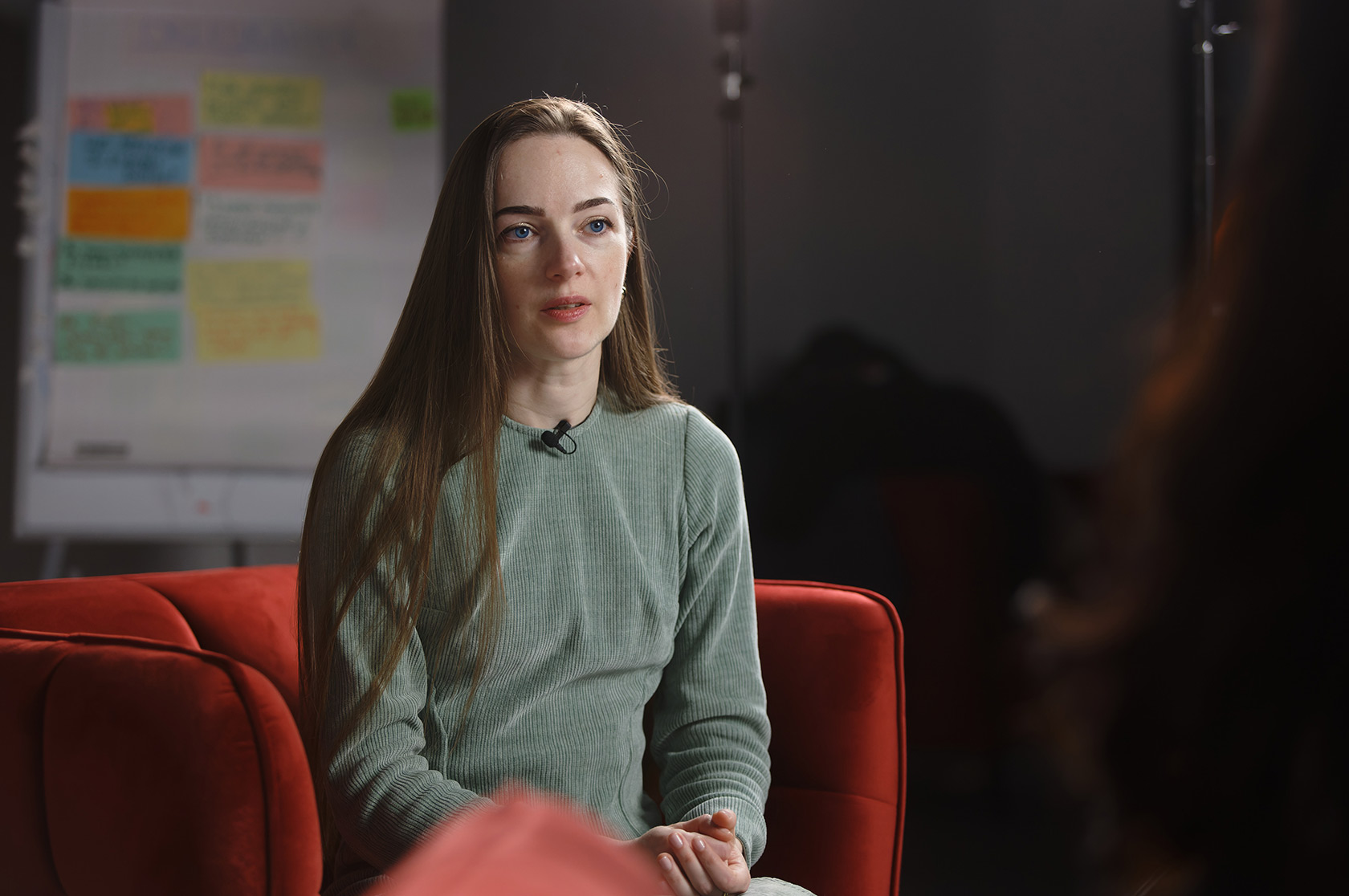
- Thinking about World War II and the past again, the Nobel Committee did not award the Nobel Peace Prize at all in those years...
- It's difficult for me to speculate about what the Nobel Committee was trying to communicate with their decision or how they arrived at it. We will only find out about that in 50 years' time when the currently sealed documents are released. But what I can see is a crisis in the understanding of human rights which extends beyond the Russian Federation's full-scale war.
I know what I'm talking about when I say, on every international platform I'm given, that this isn't a war between two countries but a war of two systems: authoritarianism and democracy. Throughout all these years, human rights advocates like me have observed how forces that openly cast doubt on the principles of the Universal Declaration of Human Rights have started to gain momentum, even in countries with advanced democratic systems. Even people who live in countries with advanced democratic systems, and who make decisions about how to elect their governments and what the remit of the government's responsibility should be, are from a generation which is less concerned with human rights; they are consumers of human rights values.
They inherited those values rather than fought for them. "Our values matter most not when it's easy to embody them, but when it's really hard." I wanted to explicitly state this in my Nobel Lecture, because when we talk about human rights values, it's more than a set of words that have to be said out of a sense of propriety or duty. Human rights values are what determines how you act.
And yet the citizens of democratic countries today easily trade human rights and freedoms for economic achievements, an illusion of safety, promises of greatness. They accept such trade-offs because they don't understand what freedom is and what human rights are. But this is a very dangerous phenomenon.
Because, once again, human rights are inextricably linked with peace. - Since you mentioned your Nobel Lecture, I'd like to compare some excerpts from your lecture and another one. You said: "The Russian people will be responsible for this disgraceful page of their history and their desire to forcefully restore the former empire."
Meanwhile, Jan Rachinsky, who heads Memorial, said: "It is not worth talking about 'national' or any other collective guilt at all - the notion of collective guilt is abhorrent to fundamental human rights principles." How would you respond to your colleague, whom you undoubtedly respect? - It's peculiar to have to explain this to Memorial, because who, if not them, should understand the importance of responsibility, and of this evil which has so far gone unpunished, for our future?
I suspect that my colleague must have been referring to the legal concept of guilt. There is a difference between the legal concept of guilt and responsibility. Because in legal terms, guilt implies having committed a crime yourself.
But that's not what we are talking about right now. What we are talking about is the fact that this isn't Putin's war, that the majority of Russians support this war. What we are talking about is the fact that we have to face the truth: it's not just repressions and censorship that allow Putin to govern Russia.
He governs Russia because of the social contract between the Kremlin elites and the Russian people. One of the central premises of this social contract is so-called Russian greatness. Unfortunately, the majority of Russians envision their Russian greatness as the restoration of the former Russian Empire, even through force.
It is this imperial culture that paves the way to all these horrible crimes, to the war that the Russian Federation has been waging against Ukraine for the past eight years, and to the wars it waged earlier against other peoples. If we take a moment to reflect on what sort of country the Russian Federation is right now, we can see that it is a country that bans federal republics from teaching their native languages in schools and universities. It seems to me that Russians have to rethink the central principles of their country.
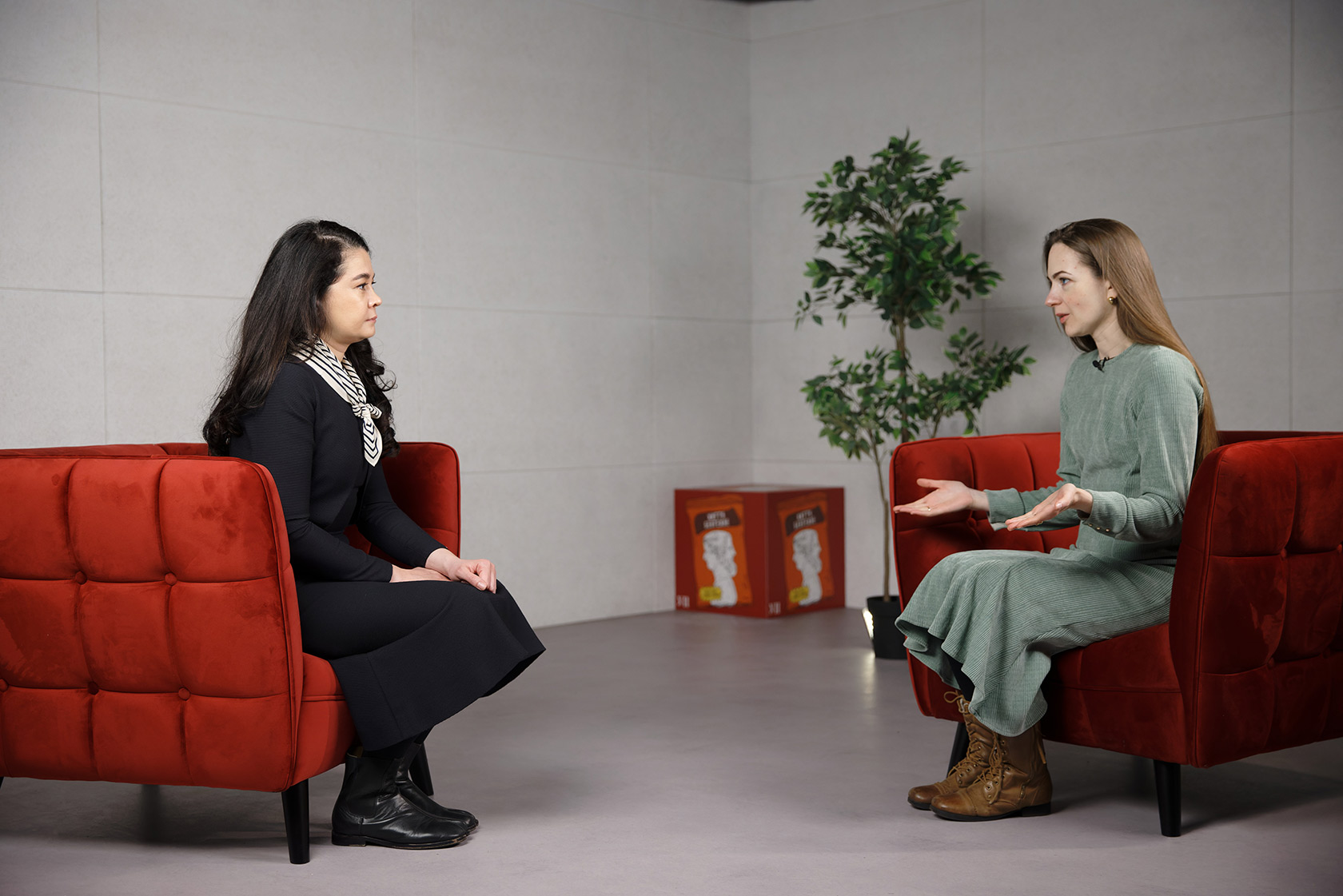
- But so far it seems that even human rights advocates aren't capable of rethinking them.
Why is that? Do you have an explanation for why this might be the case? - I think we'd have to ask Jan what he meant in his speech and why he stressed guilt where I emphasised responsibility.
It seems to me that some things can be seen more clearly from afar, because when you are part of a privileged group, you might have no idea that your actions and everything that you have are shaped by the very fact of your privilege. Let me give you another example: Russian artists. They benefited for years from the fact that Russian culture was a colonial device, and very few of them fought against that.
Even if they didn't want that to be the case, they still benefited from it, because it automatically elevated them above other artists in other countries in the space that is still referred to as the post-Soviet space. The reason I keep trying to explain what Russian human rights advocates stand for is because I have seen over the years that they are marginalised in their own country not just because they opposed the regime, but because they opposed the prevailing public opinion. - Memorial is the legacy of Andrei Sakharov.
Have Sakharov and his teachings shaped you as a defender of human rights? - I wouldn't say that it's Sakharov's teachings alone. Ukrainian dissidents - Yevhen Sverstiuk, Valerii Marchenko, Alla Horska, Vasyl Ovsiienko, Myroslav Marynovych, and others - played an important part.
All of these people talked about the same thing. They talked about a worldview, a prism through which to consider the world and which shapes your actions. Human dignity was at its core, and that's why they opposed human dignity in the face of a soulless totalitarian apparatus.
It was a brave stance. At the time, they didn't just oppose the regime but also the prevailing public opinion. I recall reading the memoir of one dissident after the Revolution of Dignity and coming across a sentence that perfectly expressed how I felt during the three months of protests.
After the Revolution of Dignity was over, journalists asked me how I envisioned victory. I thought about this for a while and realised that I had no answer. Because at the time we were working as Euromaidan SOS, giving around-the-clock legal assistance to all the protesters who were being prosecuted.
We slept for three or four hours a day, we just got on with our work. I felt like we were putting out hundreds of fires each day. Questions about visions of victory require careful reflection, which we simply had no time for.
I remembered this feeling and this question when I read that sentence in the memoir; the memoir's author said they had no hope. "We knew that we were fighting against the Soviet Union. We knew that we could be killed, we could be sent to the Soviet Gulags, or locked up in psychiatric hospitals, and that perhaps no one would ever remember our names. But we couldn't do otherwise, because we were fighting for our own human dignity."
Looking back on the history of dissidence, the history of our Revolution of Dignity, and the past 10 months of resistance during the full-scale war, I can say with confidence that you have to keep fighting, even when your efforts seem to make no sense. Results will always follow, even if sometimes you don't expect them.
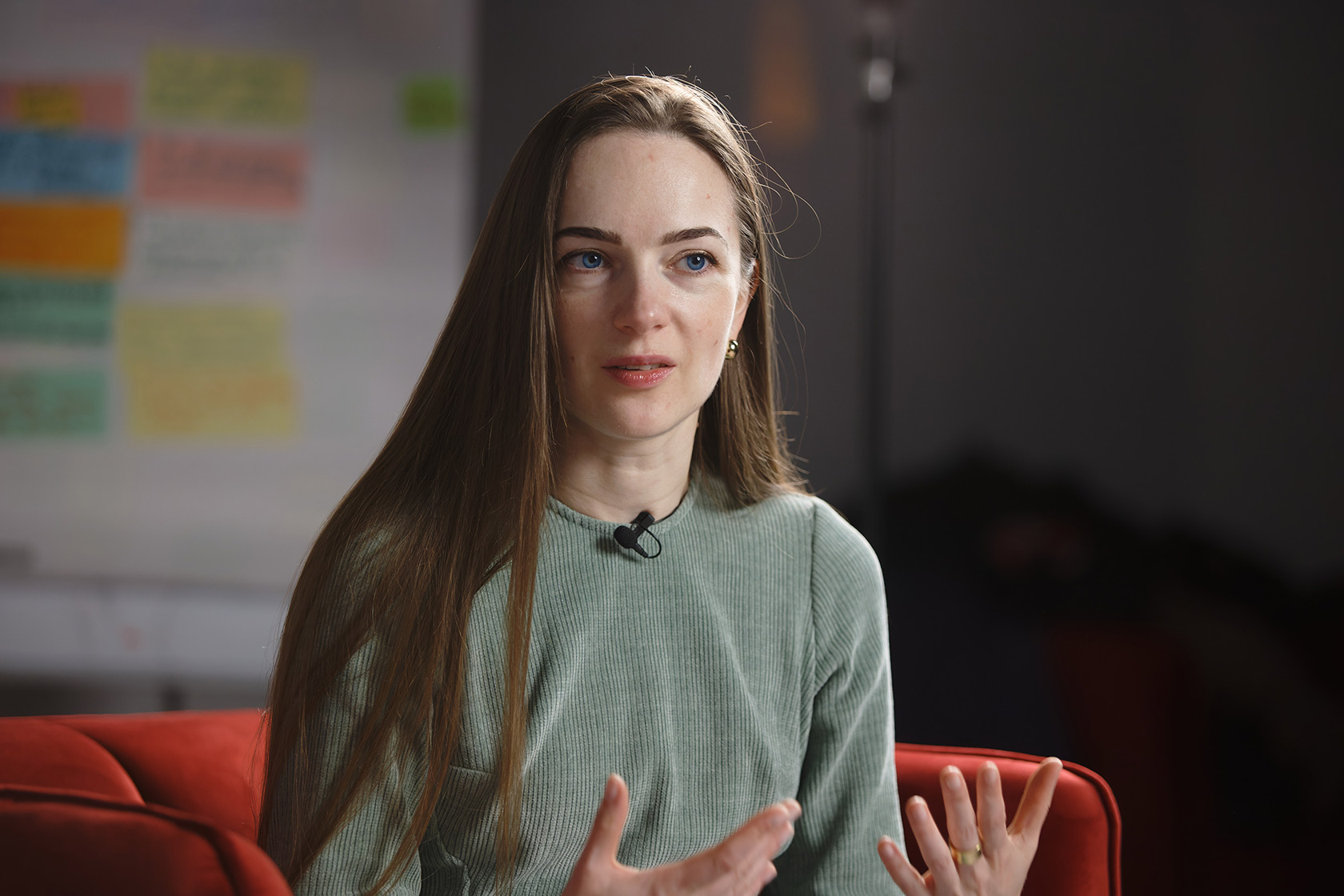
- So it's correct to say that your work as a human rights lawyer has been shaped by Ukrainian dissidents and their contribution? - I had a fateful encounter.
When I was still at school, I met Yevhen Sverstiuk, a famous Ukrainian dissident, philosopher and writer. For some reason, he singled me out and introduced me to the dissident circle; we worked together for many years. I often visited his home and spent every Christmas at his table in the company of other people from this circle.
It was a very important school for me, because I saw people who said what they thought and whose lives reflected their words. These people taught me some very important lessons. I think they are the key to our optimism.
When everyone is saying that Ukraine won't succeed, that Kyiv will fall in three or four days, you know that you have to fight and resist despite what everyone is saying. The dissidents set an example for me, showing me that even when your words and your own position are the only tools you have, you have to make use of your words and your position. This isn't so insignificant in the final count.
- I heard some of the thoughts Andrei Sakharov expressed on the pages of The New York Times in 1968 in your Nobel Lecture. Does his legacy mean something to you? - I would say that he is part of my heritage.
Human rights are not just articles in conventions, covenants or declarations. They encapsulate a particular vision of the world. Andrei Sakharov was without a doubt an outstanding person, an active person who embodied and realised many important principles.
I'm just saying he wasn't alone in this. This worldview doesn't depend on one person alone. - Yes, but it was Andrei Sakharov who received the Nobel Peace Prize, not the Ukrainian human rights advocates and Ukrainian dissidents who fought for those shared values.
Do you also think that Ukrainian human rights activism has historically been undervalued in this respect? - It's difficult for me to say how the Nobel Committee reasoned then and now. Especially because I can only retrospectively assess the information space of the past, and whether Ukrainian dissidents could be heard in the same way that Russian ones could.
Ludmila Alekseyeva, the former chair of the Moscow Helsinki Group [a Russian human rights organisation set up in 1976 to monitor Soviet compliance with the Helsinki Accords and report on Soviet human rights abuses - ed.], said that things were always more difficult for Ukrainian dissidents because the few embassies and international media that there were, were in Moscow. Ukrainian dissidents had no access even to these few platforms. This has to be taken into account.
I would also like to say that Sakharov often mentioned Ukrainian dissidents, in his Nobel Lecture and many other lectures.
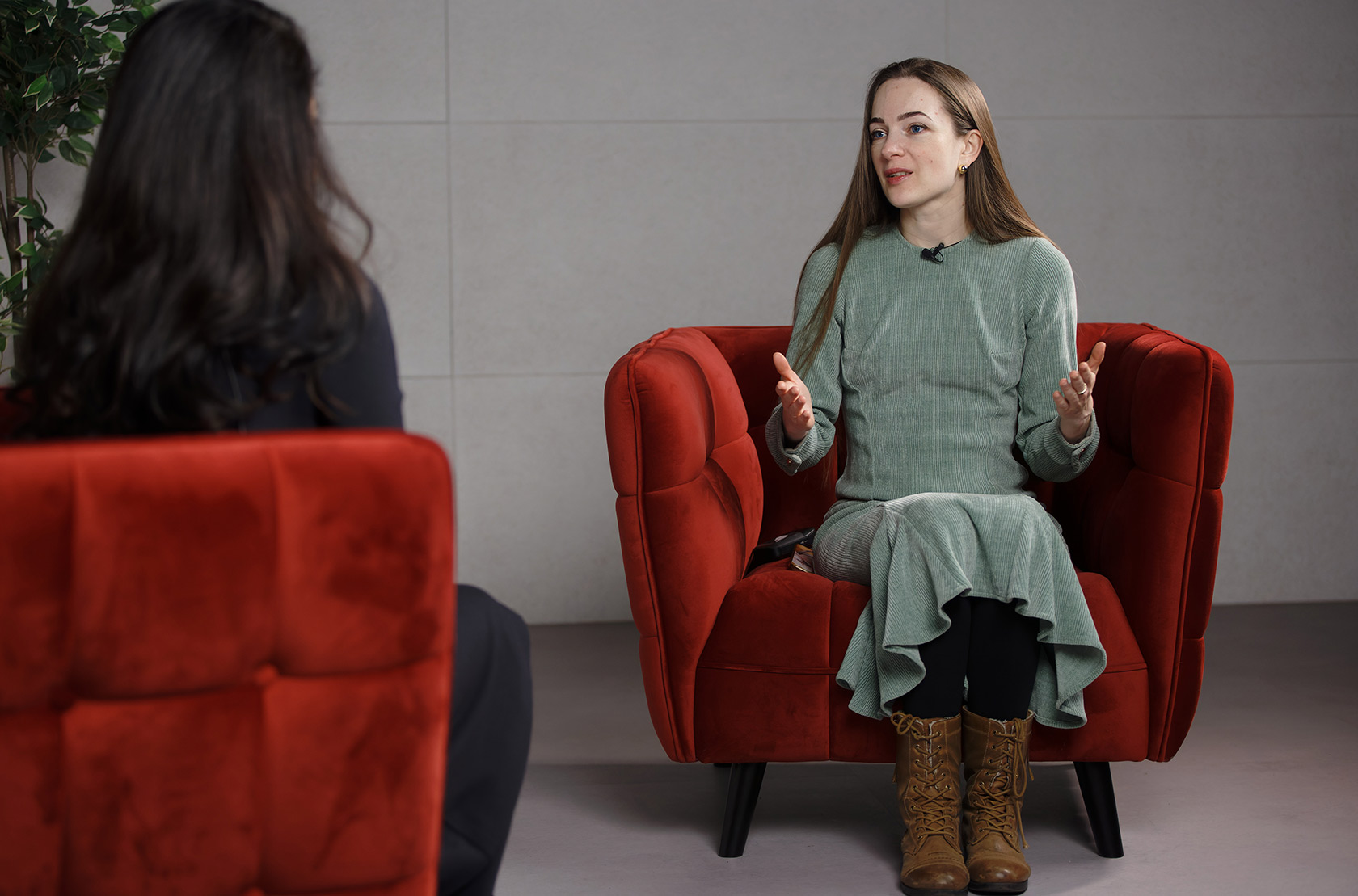
- How is the work of your human rights centre today different from the work of Ukrainian dissidents in the Soviet Union? What do you think are the main differences? - We share the same tradition of treating human beings as essentially valuable and recognising the existence of human dignity.
Recognising human dignity necessitates recognising that every human being has rights and freedoms - not just people we like. This is a worldview that leads to a safer, more civilised society, one which gives people opportunities to grow and develop and to live peacefully. As for the differences...
I think that we have immensely better fighting conditions. Just consider how fast and interconnected the world has become, how everything is now online. Let me give you an example.
I stayed in Kyiv when the Russian troops were trying to encircle it, when they were in Bucha, Motyzhyn and Vorzel. People were evacuating from those cities under shelling. The Russians were firing at civilian cars in which people were trying to flee with their families and children, but people still managed to escape.
We gathered people's testimonies about what was happening in the occupied territories. We realised that people were being murdered, tortured, raped, that the Russians were terrorising the local population in order to maintain control over the territory. And yet it wasn't when the Russians were killing those people and we were talking and writing about it and appealing [to the international community] that we started receiving the first major weapons supplies and the first sanctions against Russia were introduced.
It was when foreign journalists came and shared those horrible photos and videos from Bucha. Soviet dissidents couldn't have even imagined evidence-gathering like that. They couldn't convey the reality with such speed, making it clearly visible to everyone.
Why should justice depend on the strength of an authoritarian regime?
- Protecting human rights requires a combination of two things: legal mechanisms to defend the victims of human rights violations and abuse, and empathy towards human tragedy.
What comes first for you: the legal mechanisms, or empathy and support? - Speaking about myself personally, my main motivation has always been to fight injustice. But if I had to choose between those two things, I would of course choose empathy over the legal aspects.
I would never have imagined I'd be documenting war crimes, precisely because I am very empathetic. It makes this work very difficult. When we were working on our first joint report in 2014, several other human rights organisations were involved.
I was working in a mostly male team, and we had a very democratic mechanism for deciding who would be responsible for different parts of the report. I said that I would work on the Torture section. Not because I was interested in instances of torture, but because I already knew back then that those things were here to stay, and I wanted to prepare myself for that reality.
I couldn't prepare myself. You can't maintain any distance, you can't get used to all this unimaginable pain. Even if you are not experiencing it first-hand, but documenting it, it's still extremely difficult.
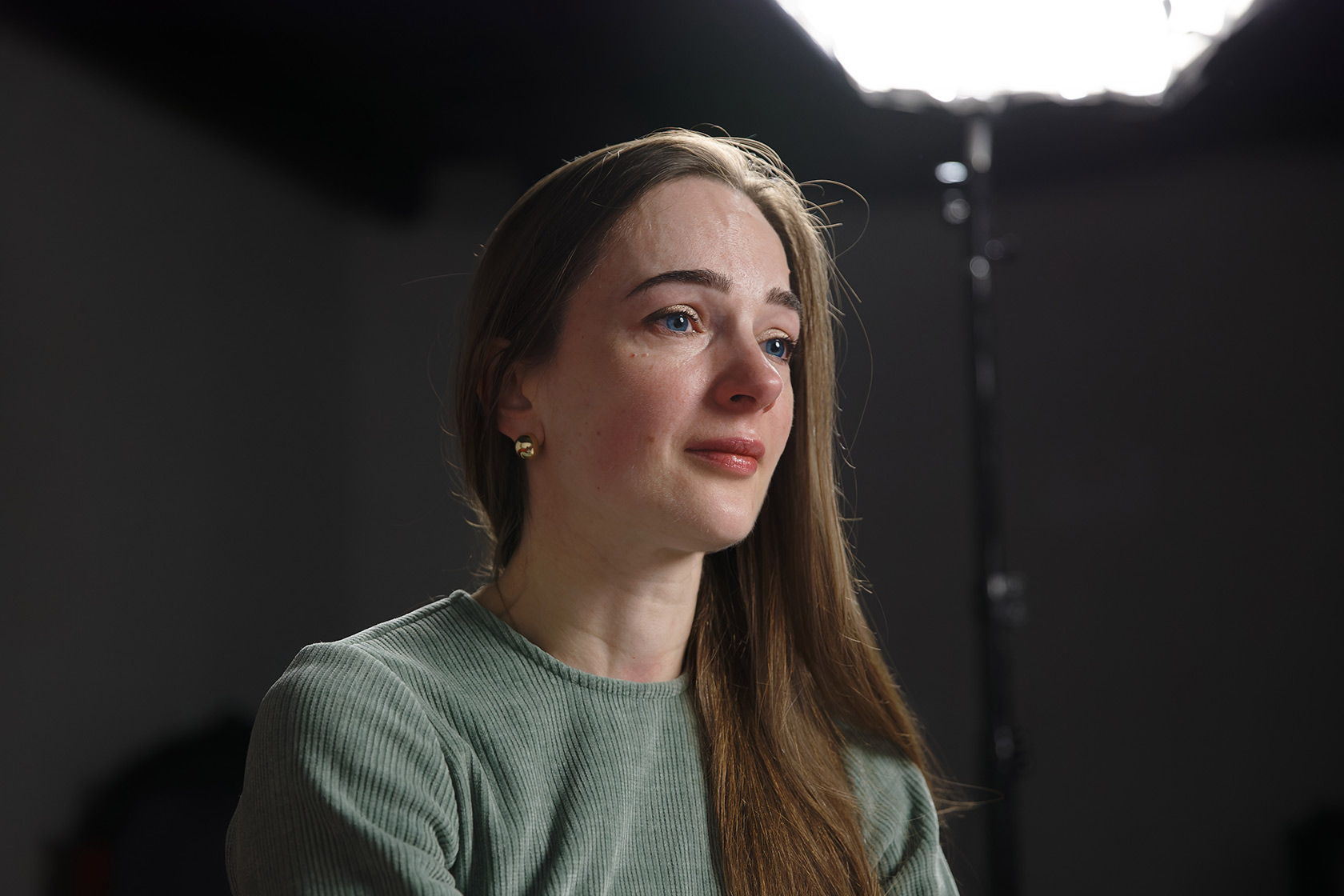
- Do you talk to victims yourself?
- Over the past eight years I've spoken to more than a hundred people who had been released from captivity. In the last few months I started to ask myself: who is the beneficiary of all this documenting, past and present? We now have records of around 28,000 war crimes as part of the joint Tribunal for Putin initiative which was launched when Russia's full-scale invasion began.
I recall that our fellow human rights lawyers in Russia have close to a million cases from Chechnya. So what? Nothing's changed!
That's why in the last couple of months I personally have spent less time talking to the victims [of Russian war crimes]. Our task right now is to create new legal mechanisms to hold Putin, Lukashenko and other Russian war criminals to account. - Could you tell me a bit more about these mechanisms and how you envision them?
Your Nobel Lecture made it clear that you believe that the existing mechanisms are not sufficient. In your speech you also recalled the Nuremberg trials, which sought to prosecute representatives of the defeated Nazi Germany in the wake of World War II, and you said that we have no time to wait for a similar trial. How do you envision the use of legal mechanisms to bring Putin and Lukashenko to justice while the war is ongoing?
- As a lawyer I know that law is dynamic. It's not something that is created once and for all. Ideas that once seemed marginal - such as intervening in the domestic affairs of a state which is violating human rights - are now basic principles of international law.
So I have no reservations about developing this international legal architecture to make sure it meets the needs of our time. When I mentioned the Nuremberg trials, I was talking specifically about the mental barrier I have seen during my advocacy trips to many different countries, when I talked to heads of state, prime ministers, ministers, parliamentarians, heads of political parties, and leading journalists. They are putting justice off until after the war.
But I kept asking them, "Why should justice depend on the strength of an authoritarian regime? Crimes are being committed right now, we know who's committing them, we know who the people suffering from those crimes are." The law has to give us all the tools we need now to investigate the people who committed those crimes and hold them to account.
True, we won't be able to bring them to court right now, or tomorrow. But history has shown that authoritarian regimes fall, and their leaders, who believed themselves invincible, end up in court. The idea that we have to wait for the war to be over is a mental barrier, part of our worldview.

- Have you seen changes in the mindset of the people you talk to about this?
Or are they not yet ready to process this? - The change is happening right now. In May we were talking about creating an international tribunal to supplement the work of the International Criminal Court.
The ICC's efforts are no doubt important, but it can only take on a certain number of cases. So the question is, who will investigate the rest? At the time, these ideas seemed radical and extravagant, but we're starting to see now that some countries are openly backing them.
I've had to rely on people's support my entire working life, and now I can sense it more strongly than ever. As human rights lawyers, we can't rely exclusively on legal mechanisms, because even the entire UN can't stop Russia's atrocities. That's why we are relying on individual people in different countries, explaining to them what's happening in Ukraine, telling them about the war crimes that are being committed in Ukraine, and fostering a collective demand for justice.
We are doing this to encourage people to put pressure on their governments and help us achieve our goal of bringing Russian war criminals to justice. - And yet the ICC Prosecutor, Karim Khan, recently pushed back against the plan to establish a special court to prosecute Russia's invasion of Ukraine. Why do you think he opposes the idea and how would you respond to him?
- I understand that as the head of an institution, he has to keep institutional interests in mind. One of the problems is that the governments that have signed up to the Rome Statute have defined the crime of "aggression", for example, in a way that deprives the International Criminal Court of the ability to investigate this crime in relation to Ukraine. This could change if the governments change their decision.
But we can't wait for them to do that. That's why it would be better if the International Criminal Court prosecutors turned their attention to their own investigations, to make sure they are careful, effective and quick, so that they don't take decades to complete. And also to ensure that they have more impact than the ones in Georgia, when only three people were indicted - no one from the top Russian military or political command among them.
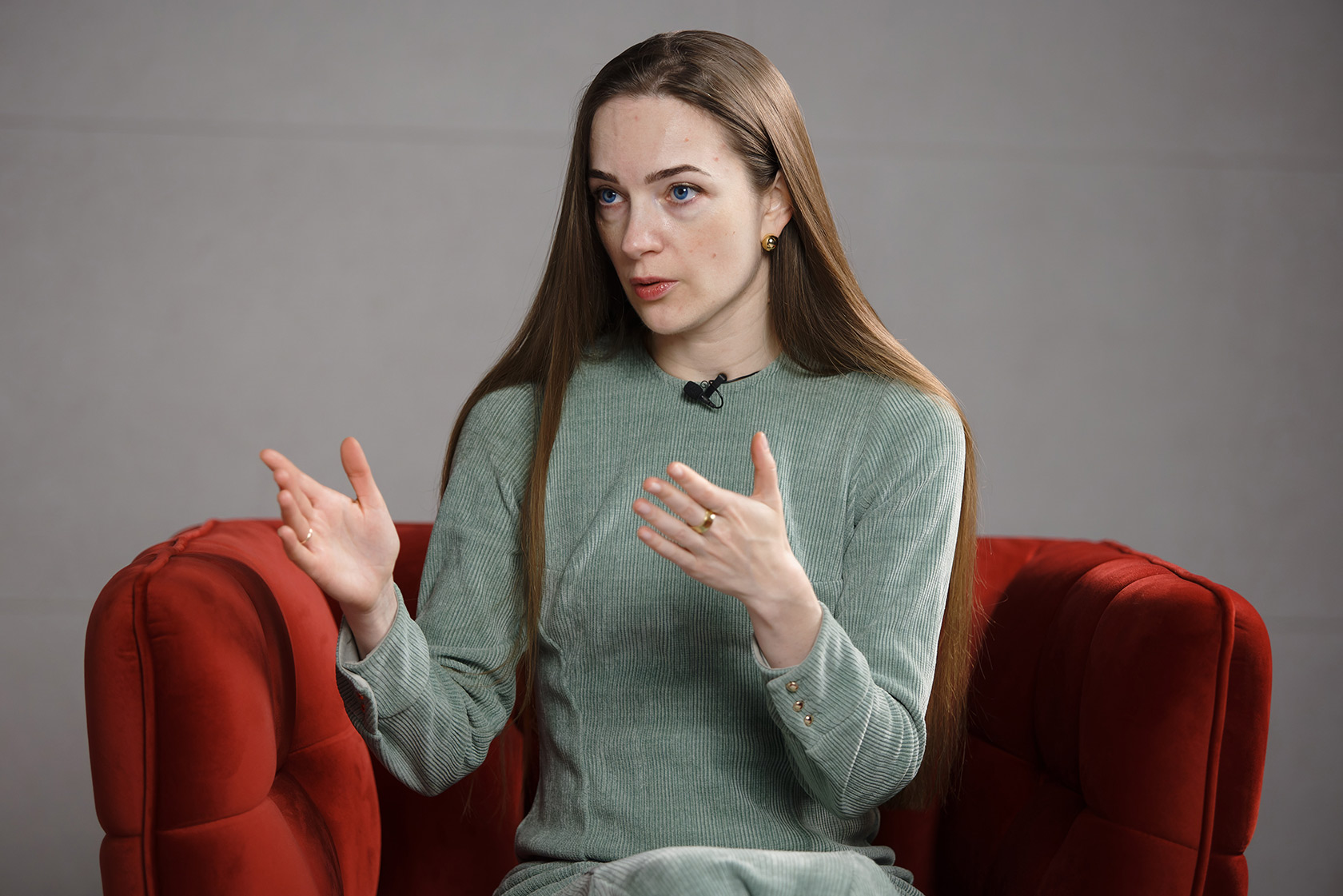
- Your organisation alone has recorded 28,000 war crimes.
You must be well aware that not all of these crimes can come to trial because of the enormous volume. What should we do with this information? - I understand that, but look at the numbers provided by the Office of the Prosecutor General; they have opened more than 40,000 criminal proceedings, meaning that they have documented more war crimes than we have.
This means that the state system is overloaded. I know for sure that the people who have gone through this hell will have to do more than rebuild their destroyed lives, their vision of the future. They also have to restore their belief in justice, however delayed it may be.
We have to change our approach and apply this principle of justice to war crimes on a global scale. Because it's wrong to say that the International Criminal Court will take on some cases, the state system will prioritise some of the remaining cases, and the rest... will be fobbed off with the usual "This is war, you must understand" [and not prosecuted]. Only the justice system can reverse this process whereby a person is turned into a number.
Because an investigation involves taking an abstract number and extracting a human story from it, figuring out what happened to that person, under what circumstances, what cruelty and crimes this person has suffered, who did it to them. This process allows the person to reclaim their dignity, to reclaim their own name. That's what justice means to me, that's what we must ensure.
That's why in addition to setting up a special court to prosecute Russian aggression, we are talking about establishing a new model which would allow this international concept to be applied at a national level, to strengthen our national system and empower it to investigate these tens of thousands of criminal proceedings.
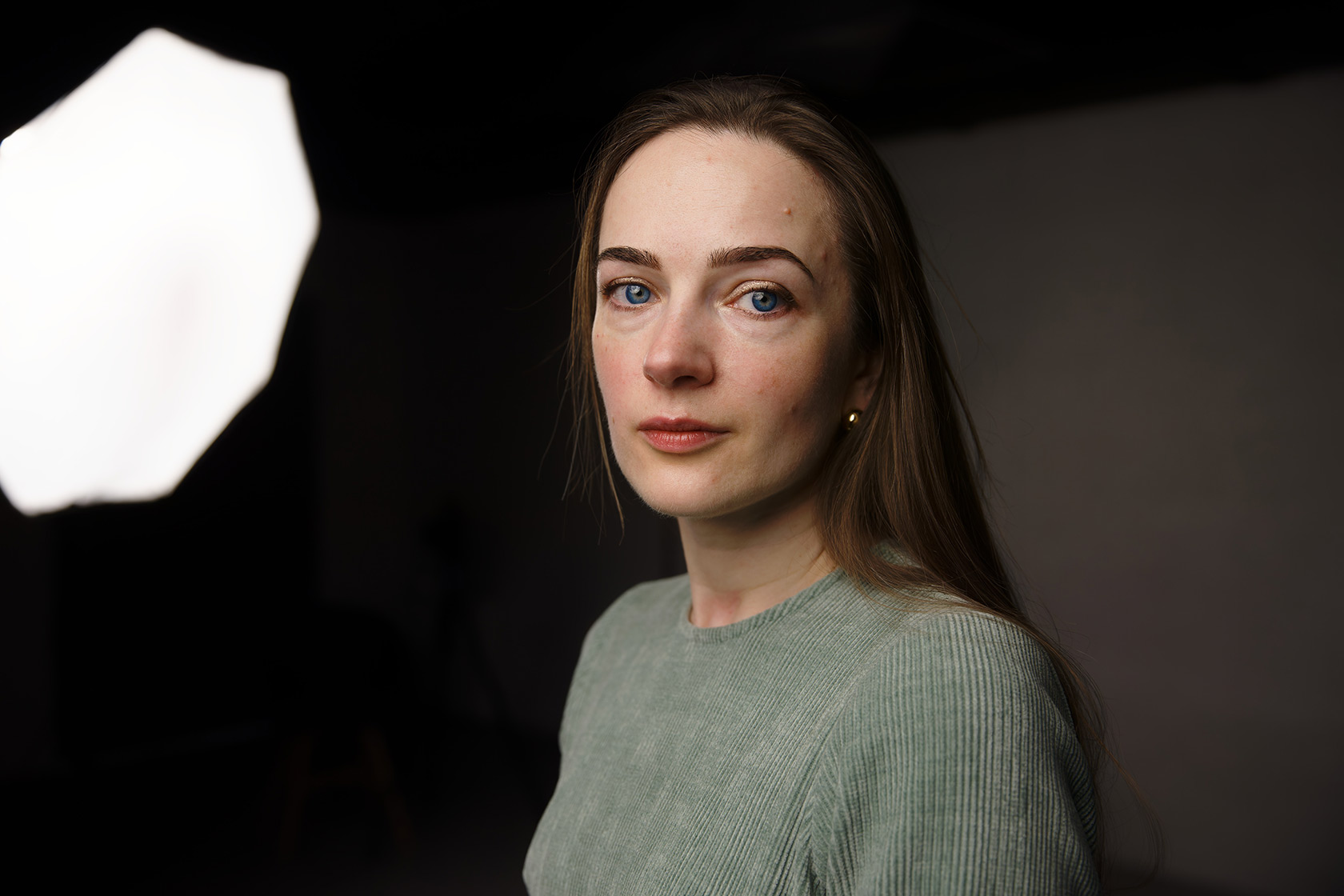
- Right now there are questions about the national system's capacity to document war crimes. How do you gather evidence, and is the process rigorous enough, in your opinion? - Currently we are conducting preliminary data collection.
We do this through a nationwide network of people trained to document war crimes. We've established this network across all of Ukraine, including the Russian-occupied territories, and we collect evidence from various sources. We send mobile units to liberated territories, interview people, and collect testimonies from those who have witnessed war crimes.
Whenever something happens, our documenters can get straight to the site of the event, take their own photos and record videos, and write descriptions of what they saw. We also rely on open sources. But documentation is only the first step in an investigation.
It must be followed by the crucial and very meticulous process of building connections between cases, establishing the course of events, recreating the full picture, and finding out who committed the crime. But this is not enough, because we are talking about justice, not revenge. We have to gather relevant evidence which would be convincing in a trial before a judge, where the other side would have a lawyer.
Because the accused are guilty beyond doubt of the crimes they are accused of. - Does the Center for Civil Liberties (let alone the national system) have enough resources to conduct quality investigations? - No.
I always give the same example. Whenever I'm asked abroad about what Ukraine needs, I say, "When the full-scale invasion started, you sent an enormous number of foreign consultants. Of course we are very grateful, we really need expert advice and consultations.
But when the fuel tank is empty, your car won't start even if you have the best driver in the world." There are many things that representatives of the law enforcement system fail to do not because they don't know what to do, but because of a lack of qualified staff. One of your colleagues, a journalist, volunteered to exhume bodies from mass graves in Izium because there weren't enough experts.
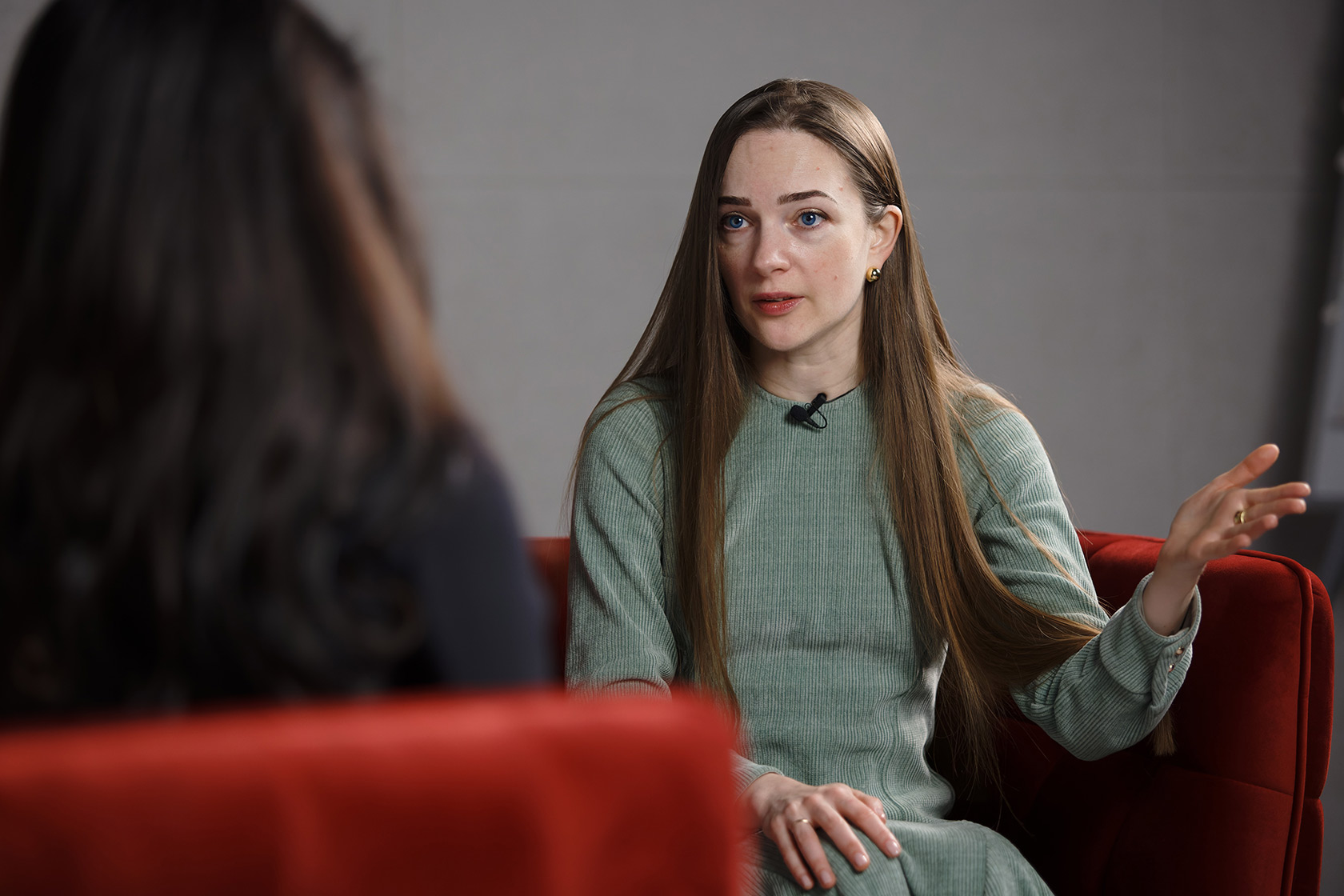
- There's the Prosecutor General's Office, there's your initiative, the Ukraine 5 AM Coalition [a coalition of human rights organisations that document war crimes and crimes against humanity committed during the Russian armed aggression in Ukraine - ed.], and a number of projects run by journalists.
All of you are documenting war crimes and gathering evidence. Does this lack of a unified front impede everyone's work? - I would also name a few other organisations which aren't part of any coalitions but are doing extremely important work.
It's important to note that we all have different methodologies and approaches to documenting crimes. For example, the Tribunal for Putin initiative, which we are part of, uses a single methodology to document all instances of war crimes; everything is included in a single database. You can't be part of the initiative and not document war crimes.
That's why we tried to bring together only those [people and organisations] that are involved in documentation efforts. We have divided up the responsibilities: each organisation covers a single region and deposits all of its materials into a single shared database. That's how we've been able to document a total of 28,000 crimes.
There are other approaches and methods. During the full-scale invasion, everyone was able to choose how to work to effectively respond to these threats. But in the future, we all have to get to the point where we hand over the materials we've gathered to the national law enforcement agency, which maintains a single database.
Because it doesn't even matter here who documented cases or how many. An organisation might have uncovered seven cases, but those seven might be cases that will shed light on 307 others. - Regarding your initiative: my understanding is that you are talking about a tribunal that will hold military and political commanders to account, as well as individual soldiers.
Is that right? - When we were thinking about what to call this initiative, we weren't even thinking about what the international legal architecture should look like, or what legal structures will be responsible for prosecuting and punishing Russian war criminals. That happened organically later on.
The original name of the initiative was very long [Breaking the Vicious Circle of Russia's Impunity for its War Crimes - ed.], so it was the shorter one that stuck. I guess there is a certain symbolism to it, since we eventually realised that there is a lack of international mechanisms and that we have to establish an international tribunal in order to punish Putin, Lukashenko and other Russian war criminals. I would say that the starting point of the legal process should not be the people who committed the crimes, but the interests of the victims of the war.
That's why it's very important for me to bring to justice those who committed crimes with their own hands, like the pilot who dropped a bomb on the Mariupol Drama Theatre when the word "Children" was spelled out right in front of the building. The commanding officer of the operation gave the orders, and Putin started this war, but it's not just them who should be held responsible for the death and suffering of the several hundred people who were hiding in the bomb shelter. The person who pressed the button [and dropped the bomb] should also be prosecuted for this crime.
- So individual offenders, specific people, both rank and file and top brass, will be held to account? - There are different degrees of evil. People who committed crimes with their own hands shouldn't get to hide behind the abstract figure of Putin.
I've worked on torture cases. Putin wasn't the one torturing people; Putin wasn't the one stuffing them into wooden cases; Putin wasn't the one pounding their knees with a hammer; Putin didn't rape them; Putin didn't force them to write things on the walls with their own blood; Putin didn't attach electric wires to their genitals. Specific individuals carried out all those actions.
These people were sure of their invincibility. It's obvious to me that this sense of invincibility has become part of Russian culture. That's why every single person has to be brought to justice.
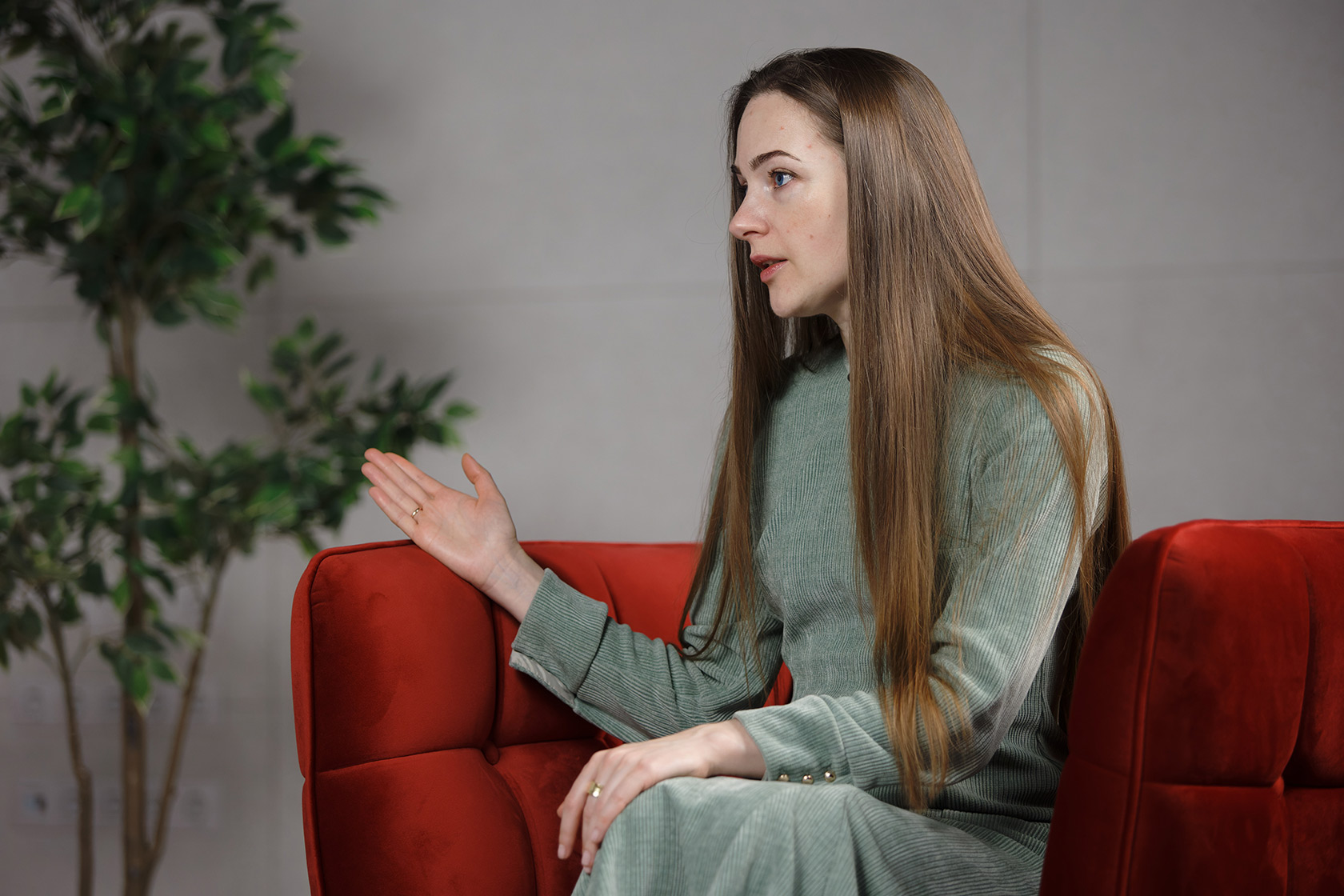
- We often hear about the genocide of the Ukrainian people from the President of Ukraine and other leaders on social media.
At the same time, we know how difficult it is to prove the fact of genocide in international law. Could you talk a bit about the prejudice that exists around this in the international community? - Yes, of course.
I think there are two types of prejudice. The first one is related to the current legal framework. The originators of the term "genocide" embedded certain meanings in it that were not reflected in the legal framework.
We have to prove that all of these murders, rapes, deportations of our people, adoptions of Ukrainian children and everything else that we have witnessed were committed with a single goal: to completely or partially destroy a particular ethnic group. This goal is clear when we consider Putin's rhetoric and the rhetoric of propagandists, the top brass and the political elite. They openly say that Ukraine is not a state; that there is no Ukrainian people, language or culture; that Ukrainians are just Russians who have forgotten that they're Russians.
That's why they have to be killed, as one Russian propagandist said: "If you don't recognise this, we will kill all of you." But it is not necessary to kill an entire ethnic group in order to destroy it completely or partially; you can just change the people's identity. That's what's happening in the occupied territories.
And that's an overall trend. Some of the territories have been under Russian occupation for the past eight years. We have seen Ukrainian language and culture disappear there - we have seen the system work to instil in people an understanding that they are Russian.
I think international lawyers who have worked on the issue of genocide for a long time are now starting to process and understand this. This is something that we have introduced into the international legal framework. There is another, subjective, matter.
I think that when famous international lawyers warn us about things, their concerns and warnings are often informed by their fear of risk. They're successful, they've won numerous high-profile international cases, and so they are afraid of committing to something that does not necessarily have a 100% guarantee of success. So it seems to me they have become hostages to their own success.
There's another important point I'd like to draw attention to: we're not just talking about investigating crimes and bringing their perpetrators to justice. While these conversations are taking place, these crimes are being committed every day. Our task is also to prevent further crimes.
So I think that while we're having these discussions about whether we have enough evidence and whether this war is genocidal, we are letting a very important issue slide. The genocide in Rwanda [which claimed the lives of 800,000 to one million people in 1994 - ed.] didn't suddenly start one day. Alarm bells had been ringing, but the international community had turned a blind eye.
So if we don't figure out how to stop this now, it's possible - though I don't want this to happen - to imagine a future time in which even sceptics, even the most hardened sceptics, will no longer doubt that a genocide is taking place. - Have you seen a growing acceptance among the international community that this is a genocide of the Ukrainian people? - I am seeing a gradual shift in public opinion, and a gradual realisation that Russia is an empire and that Ukrainians in this war are fighting for both their right of democratic choice and their right to be Ukrainians.
We need to communicate and explain this more because the existing system is inefficient and it's not working. But changing it takes a long time for various reasons, including an understandably human reluctance to implement changes when it is not clear how or whether these changes will work, and when there are enormous obstacles and resistance to change. Representatives of international organisations explain their impotence by blaming Putin, saying that Russia is ignoring international law and failing to comply with the decisions of international organisations.
They say, "What can we do?" And I tell them, "No, sorry, I have no doubts about Putin or about Russia's actions. But this is only possible in a world in which the architecture of peace and security is unable to put an end to Russian atrocities. So the problem is not just Putin, it's us, too.
We have to acknowledge this and implement a comprehensive reform of the international peace and security system. Not just for Ukraine's sake, but for the sake of other people in other countries all around the world. We live with the illusion of protection, but Ukraine's example shows that none of the existing legal mechanisms can stop Russian atrocities.
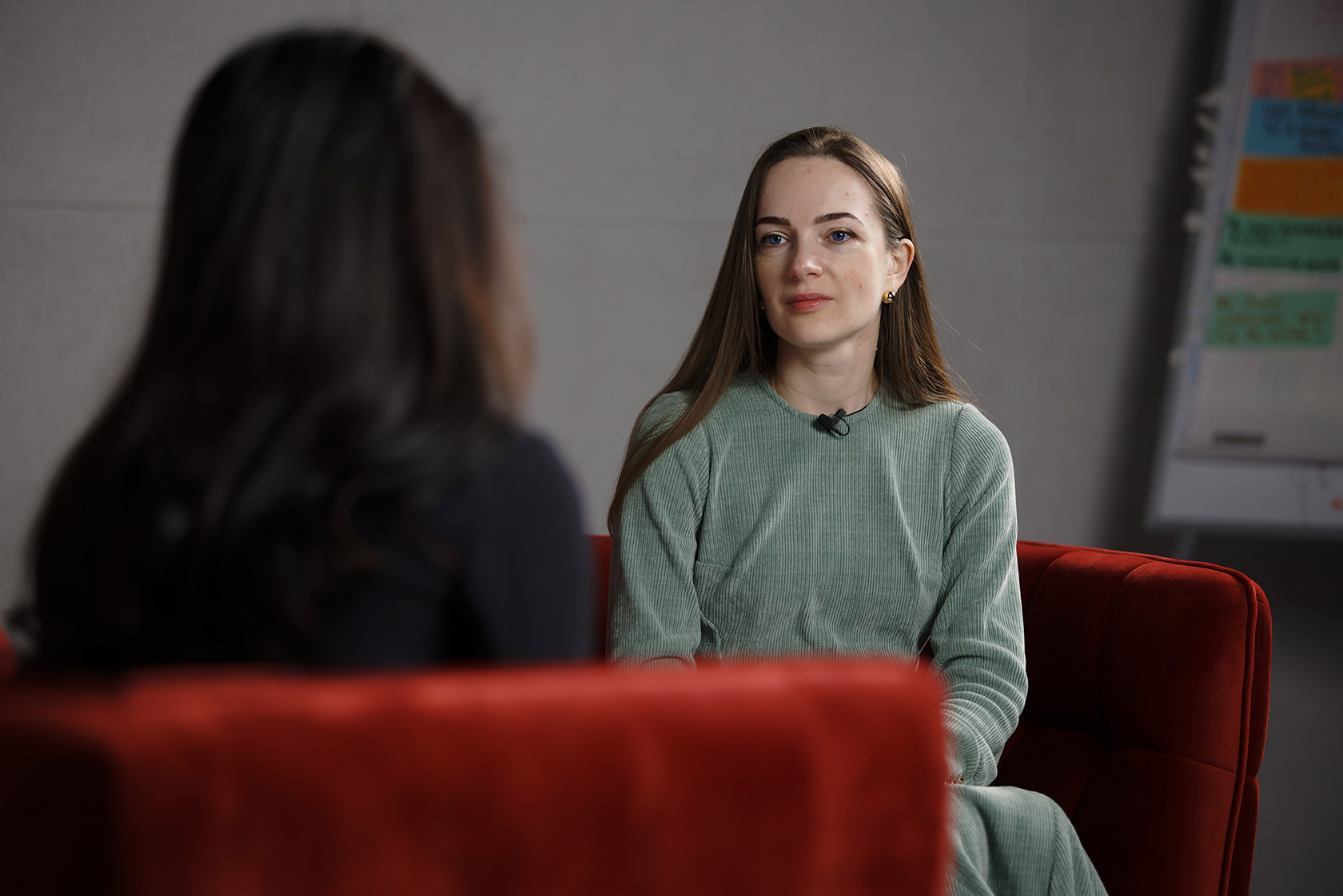
- We talked about victory in relation to the Maidan [the 2013-14 Revolution of Dignity - ed.] and you mentioned not having had time to reflect on what it would mean for you.
We're talking about victory a lot once again, but once again there is little room to reflect on what this victory would mean for each of us. How do you see Ukraine's victory in this war? How do you see the victory of Ukrainian human rights advocates?
- I can answer this question because this question is no longer about some abstract vision but a specific goal we are working towards. Ukraine's victory is not just about driving Russian troops out of our country and liberating all of the occupied territories, including Crimea. Ukraine's victory is about completing its democratic transformation.
Putin unleashed this war just as we received an opportunity to achieve this democratic transformation after the fall of an authoritarian regime, after the Revolution of Dignity. Putin is not afraid of NATO: Putin is afraid of the idea of freedom. We have to build lasting and resilient democratic institutions, so that our children and our children's children never have to go through what we are going through right now.
This is a task we have no right to delegate to anyone else. With this in mind, I imagine our victory as living in a country which no longer needs the work of the Center for Civil Liberties, at least not in its current format. - What will Oleksandra Matviichuk do when the work of the Center for Civil Liberties is no longer needed?
- When I was at school, I really wanted to become a theatre director. I think it's still not too late. Sevhil Musaieva, Ukrainska Pravda
Translation: Olga Loza
Editing: Teresa Pearce
Journalists fight on their own frontline. Support Ukrainska Pravda or become our patron!